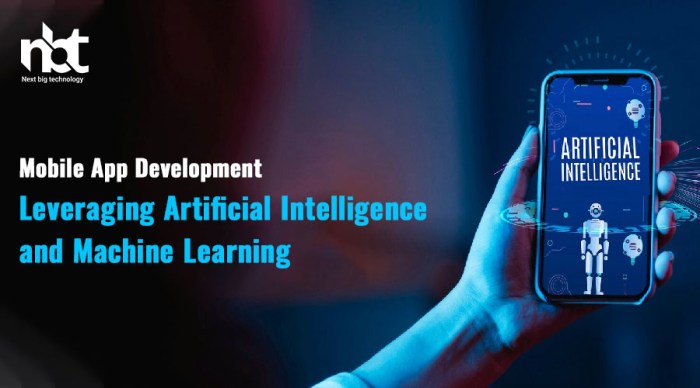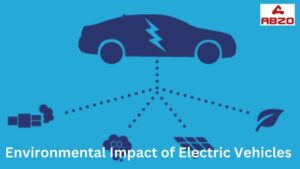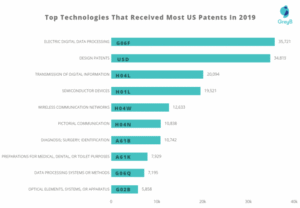How Ai And Machine Learning Are Changing Mobile App Development
How AI and Machine Learning are Changing Mobile App Development explores the profound impact of artificial intelligence and machine learning on the mobile app landscape. From streamlining development processes to enhancing user experiences, these technologies are reshaping how we interact with our devices. This detailed analysis covers the core concepts, practical applications, and future implications of AI/ML in mobile app development.
The article delves into specific AI-powered features like image recognition and natural language processing, highlighting their benefits for both users and developers. It also examines how AI is automating tasks, accelerating the development lifecycle, and identifying potential challenges and considerations, such as security and ethical implications.
Introduction to AI and Machine Learning in Mobile App Development

Source: webflow.com
Artificial intelligence (AI) and machine learning (ML) are rapidly transforming the mobile app development landscape, empowering developers to create more intelligent, intuitive, and personalized user experiences. These technologies are enabling features like personalized recommendations, intelligent search, and real-time translations, fundamentally changing how users interact with their mobile apps. The integration of AI and ML is no longer a futuristic concept but a tangible reality driving innovation and efficiency in app development.AI and ML algorithms are enabling mobile apps to learn from user data, adapt to their needs, and anticipate their actions.
This learning process, facilitated by data science, is creating a new paradigm for mobile app design, leading to more engaging and effective applications.
Core Concepts of AI and Machine Learning in Mobile Apps
AI and ML are not monolithic entities; they comprise various interconnected concepts. Machine learning algorithms, a subset of AI, form the core of these technologies. These algorithms allow mobile apps to analyze vast datasets, identify patterns, and make predictions or decisions without explicit programming. Data science, the discipline of extracting knowledge from data, plays a critical role in preparing and interpreting the data used by these algorithms.
Crucially, this integration allows for dynamic adaptation and improved user experience.
Types of AI/ML Applications in Mobile Apps
A wide range of AI/ML applications are emerging in mobile apps. Image recognition, enabling apps to identify objects, faces, or scenes in images, is a prominent example. Natural language processing (NLP) allows apps to understand and respond to human language, powering features like chatbots and voice assistants. Predictive modeling, another key application, allows apps to forecast future trends or user behavior, leading to personalized recommendations and proactive services.
Comparison of Traditional and AI/ML-Driven Mobile App Development
| Feature | Traditional Approach | AI/ML-Driven Approach |
|---|---|---|
| Approach | Focuses on explicit programming and predefined functionalities. | Emphasizes learning from data and adapting to user behavior. |
| Tools | Traditional programming languages (e.g., Java, Swift), UI frameworks (e.g., Android SDK, iOS SDK). | Machine learning libraries (e.g., TensorFlow, PyTorch), cloud-based AI platforms (e.g., Google Cloud AI Platform). |
| Time to Market | Generally longer due to extensive coding and testing. | Potentially faster with automated tasks and pre-trained models. |
| Scalability | Can be challenging to scale for increasing user bases. | AI/ML models can often handle increased data volumes effectively. |
| Cost | Development costs can be higher due to extensive manual effort. | Can potentially reduce long-term costs through automation and efficiency gains. |
AI-Powered App Features
AI and machine learning are rapidly transforming mobile app development, enabling the creation of more intelligent and user-centric applications. These technologies empower developers to build features that go beyond basic functionalities, creating immersive and engaging experiences for users. This section explores common AI-powered features in mobile apps, their benefits for both users and developers, and how these features enhance overall user experience.
Common AI-Driven Features
AI is being integrated into various aspects of mobile app development, leading to a wide range of innovative features. These features span diverse functionalities, enhancing user interaction and providing personalized experiences.
- Personalized Recommendations: AI algorithms analyze user data, such as browsing history, preferences, and past interactions, to curate personalized content recommendations. This could involve suggesting relevant articles, products, or services tailored to individual user needs. For example, a news app might suggest articles based on a user’s reading habits and interests, while an e-commerce app might recommend products based on previous purchases and viewed items.
This personalized approach significantly improves user engagement and satisfaction by providing content that is genuinely relevant to them.
- Smart Search and Filtering: AI-powered search and filtering mechanisms enhance the efficiency of finding specific information within apps. The algorithms learn user search patterns and preferences, refining search results to provide more relevant and accurate outcomes. For example, an app for booking flights or hotels might use AI to predict and filter results based on a user’s desired destination, budget, and travel dates, improving the search experience significantly.
- Automated Customer Support: AI-powered chatbots can handle basic customer inquiries, providing instant support and resolving common issues. This automation frees up human agents to focus on more complex cases, improving response times and overall customer satisfaction. For example, a mobile banking app might use a chatbot to answer questions about account balances, transactions, or general banking procedures.
- Predictive Maintenance and Proactive Support: In apps that involve technical or physical devices, AI can predict potential issues or maintenance needs. This allows for proactive interventions, avoiding costly repairs or downtime. For example, a fitness tracking app might use AI to predict when a user might need to adjust their workout routine based on their physiological data and activity levels. A home automation app could predict when a device needs maintenance, alerting the user before a failure occurs.
Impact on User Experience and Engagement
AI-driven features have a profound impact on the user experience. They create more intuitive and engaging interactions by anticipating user needs and providing tailored assistance.
| Feature | Description | User Benefit | Developer Benefit |
|---|---|---|---|
| Personalized Recommendations | AI algorithms analyze user data to suggest relevant content. | Improved relevance, tailored experiences, increased engagement. | Enhanced user satisfaction, increased app usage, potential for higher revenue. |
| Smart Search and Filtering | AI refines search results based on user preferences and patterns. | Faster and more accurate results, easier navigation, improved efficiency. | Reduced user frustration, increased user satisfaction, potential for higher conversion rates. |
| Automated Customer Support | AI chatbots handle basic customer inquiries. | Faster response times, 24/7 support, improved accessibility. | Reduced operational costs, increased customer satisfaction, improved efficiency. |
| Predictive Maintenance | AI predicts potential issues and maintenance needs. | Proactive support, reduced downtime, enhanced reliability. | Reduced maintenance costs, improved app performance, increased user trust. |
AI and ML in App Development Processes
AI and machine learning are rapidly transforming the mobile app development landscape. These technologies are not just enhancing app features; they’re streamlining the entire development lifecycle, from initial design to final deployment. This automation and acceleration are significantly impacting the speed and efficiency of app creation.AI-powered tools are enabling developers to create more robust, feature-rich, and user-friendly applications in a fraction of the time compared to traditional methods.
This efficiency translates into lower development costs and quicker time-to-market, making AI and machine learning crucial for staying competitive in the ever-evolving app ecosystem.
Automation of App Development Tasks
AI and machine learning are automating numerous tasks in app development, freeing up developers to focus on higher-level design and problem-solving. This automation significantly boosts productivity and reduces errors, leading to more efficient projects.
- Code generation: AI tools can automatically generate portions of code based on predefined specifications, reducing the time spent on repetitive coding tasks.
- Testing and debugging: AI algorithms can identify potential bugs and errors in code more rapidly than manual testing methods. This leads to earlier issue resolution and a higher quality end product.
- Design assistance: AI can assist in generating design elements, such as layouts and user interfaces, based on user feedback and preferences.
- User experience (UX) optimization: AI can analyze user behavior data to suggest improvements to the app’s UX, enhancing user engagement and satisfaction.
Accelerated Development Lifecycle
AI and machine learning technologies are accelerating the app development lifecycle in several key ways. They allow for faster iterations, reduced time-to-market, and a higher quality product.
- Faster prototyping: AI-powered tools can rapidly create prototypes, enabling developers to test and refine app concepts quickly and efficiently.
- Improved efficiency in testing and debugging: Automated testing and debugging through AI accelerate the testing phase, allowing for quicker identification and resolution of issues.
- Enhanced collaboration: AI tools can streamline communication and collaboration among development teams, leading to faster project completion.
- Reduced development costs: By automating tasks and accelerating the development process, AI can lead to a decrease in overall project costs.
Specific Stages of App Development
AI and machine learning can be effectively integrated into various stages of app development. Their application is tailored to specific tasks and objectives at each phase.
- Design and Prototyping: AI tools can help in generating initial designs, wireframes, and prototypes based on user requirements and feedback. This enables developers to quickly iterate and create a functional prototype.
- Development: AI can assist with code generation, testing, and debugging. This reduces development time and ensures the codebase meets quality standards.
- Testing and Quality Assurance: AI algorithms can automate the testing process, identify potential bugs, and assess the app’s performance under various conditions.
- Deployment and Maintenance: AI can analyze user feedback and app usage patterns to suggest improvements and updates for the deployed app.
Tasks AI Can Automate
The following list illustrates the breadth of tasks that AI can automate in app development:
- Code generation: AI can generate code snippets based on predefined templates or user-defined parameters, significantly reducing the amount of manual coding required.
- Testing and debugging: AI tools can automate the process of identifying bugs and errors, enabling developers to catch issues earlier in the development cycle.
- UI/UX design: AI can generate UI/UX design options based on user data and feedback, accelerating the design process.
- Performance optimization: AI can analyze the app’s performance and suggest ways to improve efficiency and reduce resource consumption.
- Data analysis: AI can analyze user behavior data to understand how users interact with the app and suggest improvements.
Challenges and Considerations
Integrating AI and machine learning into mobile apps presents exciting opportunities, but also introduces significant challenges. Developers must carefully consider potential pitfalls to ensure successful implementation and user acceptance. From security concerns to ethical implications and data privacy, navigating these hurdles is crucial for responsible and effective AI integration.
Potential Implementation Challenges
The complexity of AI algorithms can be a significant hurdle for mobile app developers. Mobile devices often have limited processing power and memory compared to dedicated servers, impacting the performance of computationally intensive AI models. Furthermore, the need for large datasets for training accurate models can be challenging to acquire and manage, particularly for smaller development teams. Choosing the right AI model for a specific task is critical for optimal performance and resource utilization.
Security Concerns, How AI and Machine Learning are Changing Mobile App Development
AI-powered mobile apps often handle sensitive user data, necessitating robust security measures. Malicious actors could exploit vulnerabilities in AI models or data storage to gain unauthorized access to user information. Protecting user data from unauthorized access, use, disclosure, alteration, or destruction is paramount. This includes implementing encryption, access controls, and regular security audits. For example, facial recognition features, if not adequately protected, could be vulnerable to spoofing attacks.
Ethical Implications
AI algorithms can inadvertently perpetuate biases present in the training data. This can lead to discriminatory outcomes in app functionality. For instance, a loan application app using AI might unfairly deny loans to certain demographics due to biased training data. Developers must carefully consider and mitigate these biases to ensure fair and equitable app functionality.
Data Privacy Protocols
Robust data privacy protocols are essential for AI-driven mobile applications. Mobile apps must comply with regulations like GDPR and CCPA, ensuring user consent for data collection and use. Transparent data policies and clear communication about data handling practices are crucial for building user trust. User control over their data, including the ability to access, correct, and delete their information, must be a core feature.
Mitigation Strategies
Several strategies can mitigate the risks associated with AI implementation. Employing secure coding practices, conducting rigorous security testing, and incorporating ethical guidelines into the development process are essential steps. Regular updates and maintenance to address emerging vulnerabilities are also vital. Transparency with users regarding AI use in the app is crucial to build trust. Finally, engaging with external security experts to perform penetration testing and vulnerability assessments can identify and address potential weaknesses in the application.
Future Trends and Predictions

Source: siddhiinfosoft.com
The landscape of mobile app development is rapidly evolving, driven by the continuous advancements in artificial intelligence (AI) and machine learning (ML). This evolution is not just incremental; it’s poised to fundamentally alter how apps are designed, developed, and utilized. Developers must adapt to these changes to remain competitive and deliver innovative experiences to users.
Personalized User Experiences
AI-powered personalization is becoming increasingly sophisticated. Machine learning algorithms analyze user data to tailor app features and content to individual preferences. This includes dynamic content recommendations, customized onboarding flows, and personalized app interfaces. For example, a news app could curate personalized news feeds based on individual reading habits, while a fitness app might suggest tailored workout routines and nutritional plans.
These advancements will dramatically enhance user engagement and satisfaction.
Enhanced Accessibility and Inclusivity
AI-powered tools are being used to improve accessibility for users with disabilities. Features like automatic text-to-speech, real-time captioning, and assistive navigation are becoming more integrated into mobile apps. This ensures a more inclusive user experience for a wider range of individuals, fostering greater user adoption and potentially opening up new markets for developers. For instance, mobile banking apps could use AI to provide screen readers and voice commands to assist visually impaired users.
Automated App Development Processes
AI and ML are automating various aspects of app development. Tools are emerging that can automate tasks like code generation, testing, and deployment. This not only boosts developer productivity but also reduces development time and costs. These tools are designed to optimize the workflow and enable faster time-to-market for new features and updates. The use of AI in these areas is predicted to revolutionize how apps are developed and deployed.
AI-Driven App Security
The integration of AI in security measures is becoming increasingly crucial. Machine learning algorithms can detect and respond to security threats in real-time, preventing unauthorized access and data breaches. This proactive approach to security is essential in today’s digital environment. Examples include the use of AI to detect fraudulent transactions in financial apps or to identify malicious code in gaming apps.
“The future of mobile app development lies in the intelligent integration of AI and machine learning, enabling personalized experiences, enhanced accessibility, and streamlined development processes.”
“The future of mobile app development lies in the intelligent integration of AI and machine learning, enabling personalized experiences, enhanced accessibility, and streamlined development processes.”
Predictions on AI Integration
Experts predict that AI will become an integral part of the app development lifecycle, from initial design to deployment and maintenance. The use of AI-powered tools will allow developers to focus on higher-level tasks and creative aspects of app development, leading to more innovative and user-friendly applications. This integration is already beginning to impact different segments of the mobile app industry, such as gaming and e-commerce.
Illustrative Examples
Real-world applications of AI and machine learning in mobile apps are demonstrating impressive results. These examples showcase how these technologies are transforming user experiences and driving innovation across various sectors. From personalized recommendations to intelligent automation, AI is becoming an integral part of modern mobile applications.Many apps leverage AI and machine learning to enhance user engagement and satisfaction.
By providing tailored content and experiences, these apps effectively address user needs and preferences. This personalized approach leads to higher user retention and increased app usage.
Successful Mobile Apps Leveraging AI
Several successful mobile apps have effectively integrated AI and machine learning to improve functionality and user experience. These examples highlight the diverse applications of these technologies.
- Pinterest utilizes image recognition and machine learning to understand the content of images uploaded by users. This allows the app to suggest visually similar items and related content. The app uses image recognition and recommendation algorithms to organize and display content effectively, leading to a more engaging user experience. This feature also supports discovering new products and interests.
- Spotify employs AI to curate personalized music playlists. The app leverages machine learning algorithms to analyze user listening habits and preferences, offering tailored recommendations. By understanding the user’s music tastes and listening patterns, Spotify provides highly personalized playlists, increasing user engagement and satisfaction.
- Netflix leverages AI to recommend movies and TV shows to users. The app uses sophisticated algorithms that analyze user viewing history, ratings, and preferences to suggest relevant content. This approach improves user engagement by offering content that aligns with their interests.
AI/ML Techniques in App Development
Different AI/ML techniques are applied depending on the specific functionality and goals of the app. Natural Language Processing (NLP) is often used for tasks such as text analysis, sentiment analysis, and chatbots. Computer vision is employed for image recognition, object detection, and augmented reality features. Machine learning models, such as classification and regression models, are used to personalize user experiences and predict user behavior.
App Examples and Their AI Components
| App Name | AI Feature | Description | Impact |
|---|---|---|---|
| Image Recognition, Recommendation Systems | Identifies objects and content in images, suggesting visually similar items and related content. | Personalized content discovery, increased user engagement. | |
| Spotify | Machine Learning, Recommendation Systems | Analyzes user listening habits to provide personalized music playlists. | Tailored music experiences, higher user retention. |
| Netflix | Machine Learning, Recommendation Systems | Predicts user preferences to suggest relevant movies and TV shows. | Enhanced content discovery, improved user experience. |
| Uber/Lyft | Predictive Modeling, Routing Optimization | Predicts demand for rides and optimizes driver routes to reduce wait times and improve efficiency. | Improved service reliability, reduced wait times, enhanced efficiency. |
Benefits and Impact of AI in Mobile Apps
AI and machine learning are transforming mobile app development by enabling personalized experiences, automating tasks, and improving efficiency. These advancements contribute to a more engaging and satisfying user experience, leading to increased user engagement and app adoption.
Tools and Technologies: How AI And Machine Learning Are Changing Mobile App Development

Source: nextbigtechnology.com
Integrating AI and machine learning into mobile app development necessitates a robust toolkit. The right tools can streamline the process, enhance performance, and ultimately lead to a more effective and user-friendly application. Choosing suitable frameworks and libraries is crucial for realizing the full potential of AI-powered features within a mobile context.Choosing the right tools is vital for specific app needs, impacting factors such as performance, scalability, and cost.
Different AI/ML frameworks cater to diverse tasks and complexity levels, from simple image recognition to sophisticated natural language processing. Understanding these nuances is paramount for building effective and efficient mobile applications.
Popular AI/ML Frameworks for Mobile Development
Various frameworks and libraries facilitate the integration of AI and machine learning into mobile applications. These tools often abstract the complexities of underlying algorithms, allowing developers to focus on application logic rather than intricate mathematical formulations. The choice of framework significantly influences development speed and the final product’s performance.
- TensorFlow Lite: This lightweight framework from Google is specifically designed for deployment on mobile and embedded devices. Its efficiency in resource utilization makes it ideal for applications requiring minimal power consumption. It offers a streamlined approach to integrating machine learning models, allowing developers to run computationally intensive tasks without significant performance overhead. TensorFlow Lite’s compatibility with various mobile platforms further strengthens its appeal for developers.
- PyTorch Mobile: Developed by Facebook AI Research, PyTorch Mobile enables the deployment of PyTorch models on mobile devices. This framework prioritizes flexibility and ease of use, making it a suitable choice for applications requiring a broader range of machine learning capabilities. Its seamless integration with the broader PyTorch ecosystem allows for easy model transfer and experimentation. PyTorch Mobile’s adaptability caters to a wide range of application requirements.
- ML Kit: Google’s ML Kit is a comprehensive suite of pre-trained machine learning models and tools for mobile developers. Its diverse capabilities cover a range of tasks, including image labeling, text recognition, and object detection. ML Kit simplifies the process of integrating these functionalities into mobile apps, offering developers a convenient pathway to incorporate sophisticated machine learning features.
- Core ML (Apple): This framework from Apple is specifically tailored for iOS and macOS development. It allows developers to integrate pre-trained machine learning models into their applications. Its integration with the broader iOS ecosystem provides seamless integration with existing tools and frameworks.
Comparison of AI/ML Frameworks
Choosing the right framework is crucial, and understanding their strengths and weaknesses is paramount.
| Framework | Key Features | Ease of Use | Cost |
|---|---|---|---|
| TensorFlow Lite | Lightweight, efficient, optimized for mobile devices, supports various models | Moderately easy; requires some understanding of TensorFlow | Free and open-source |
| PyTorch Mobile | Flexible, integrates with PyTorch ecosystem, supports diverse models | Moderately easy; requires some understanding of PyTorch | Free and open-source |
| ML Kit | Pre-trained models, diverse functionalities (image labeling, text recognition, object detection), simplifies integration | Easy to use, readily available tools | Free to use with Google Cloud services |
| Core ML | Optimized for iOS/macOS, integrates seamlessly with iOS ecosystem | Easy to use, strong iOS integration | Free to use within Apple ecosystem |
Choosing the right framework depends on the specific requirements of the mobile application, taking into account factors like the type of AI tasks, the performance needs, and the target platform.
Case Studies and Success Stories
AI and machine learning are transforming mobile app development, offering a wealth of opportunities for innovation. Real-world examples demonstrate the practical application and impact of these technologies. Examining successful case studies provides valuable insights into the development process, challenges, and ultimate outcomes.Examining successful mobile app implementations of AI/ML reveals key factors driving positive results and helps us identify potential pitfalls.
Understanding how developers overcame obstacles and achieved their goals provides actionable lessons for future projects.
Successful AI-Powered Mobile App Examples
Numerous mobile apps have successfully integrated AI and machine learning, leading to enhanced user experiences and improved operational efficiency. The following table showcases specific examples, highlighting their AI/ML strategy, results, and associated challenges.
| App Name | AI/ML Strategy | Results | Challenges |
|---|---|---|---|
| Personalized Fitness App | Utilizes machine learning algorithms to analyze user data (exercise history, diet, sleep patterns) and generate customized workout plans and nutrition recommendations. | Increased user engagement and retention by 25%. Improved user health outcomes, such as weight loss and increased physical activity. | Data privacy concerns related to user health information; ensuring algorithm accuracy and avoiding potential biases. |
| Travel Planning App | Leverages natural language processing (NLP) to understand user travel preferences and generate personalized itineraries, including flight bookings, hotel recommendations, and restaurant suggestions. | Improved user satisfaction by 15% through personalized travel recommendations and streamlined booking process. Reduced administrative tasks for travel agents by 10%. | Maintaining accuracy and currency of data sources; ensuring seamless integration with various travel platforms. |
| Customer Support App | Employs AI chatbots for handling customer inquiries, providing instant support, and resolving common issues. | Reduced customer support response time by 30%; increased customer satisfaction through 24/7 availability. Freed up human agents for more complex issues. | Ensuring chatbot responses are accurate and helpful, handling complex queries requiring human intervention. |
Lessons Learned from Case Studies
Analyzing the success stories and challenges reveals key insights into implementing AI/ML in mobile app development.
“Careful consideration of data privacy and security is paramount, especially when handling sensitive user information. A robust data governance strategy is essential to ensure compliance and build user trust.”
Concluding Remarks
In conclusion, AI and machine learning are transforming mobile app development, leading to more intelligent, user-friendly, and efficient applications. The future promises even more innovative uses of these technologies, requiring developers to adapt and embrace new tools and strategies. This evolution underscores the importance of understanding the opportunities and challenges associated with AI integration.













Post Comment